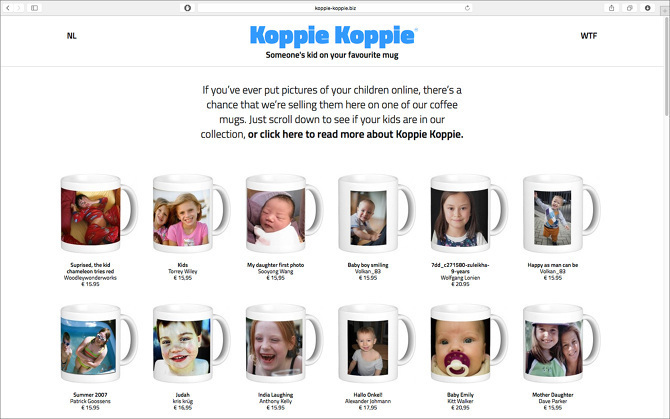Difference between revisions of "Koppie Koppie"
(Created page with "Koppie Koppie ''[http://koppie-koppie.biz/ Koppie Koppie website]'' With social media being a huge part of our daily life nowadays, we barely even think about the privacy a...") |
Rümeysa Önal (talk | contribs) |
||
| Line 16: | Line 16: | ||
[[File:Koppiekoppie.jpg|frame|right|Koppie Koppie, Someone's kid on your favourite mug by Dimitri Tokmetzis and Yuri Veerman]] | [[File:Koppiekoppie.jpg|frame|right|Koppie Koppie, Someone's kid on your favourite mug by Dimitri Tokmetzis and Yuri Veerman]] | ||
| + | |||
| + | [[Category:projects]] | ||
| + | [[Category:ownership]] | ||
| + | [[Category:impact]] | ||
Revision as of 14:14, 29 October 2018
Koppie Koppie
With social media being a huge part of our daily life nowadays, we barely even think about the privacy and safety when posting our lives onto the web. In fact, most people who post stuff online seem to think it is harmless. As a reaction to the lack of awareness, Dimitri Tokmetzis and Yuri Veerman launched the project ‘Koppie Koppie, a webshop which sells mugs featuring photos of strangers' children, which is perfectly legal thanks to Flickr license settings.
their motto: "Someone's kid on your favorite mug,” They sell 61 different mugs, all of which have pictures of random children lifted directly from photo-sharing service Flickr. What they are trying to prove? They want to show that lots of people have no clue in what type of space their children are floating around when they put them on the web. These images maybe feel private but are in fact very public because the license says its is free for anyone to 'copy and redistribute the material in any medium or format' and to 'remix, transform, and build upon the material for any purpose, even commercially'.
However, this project was not made to joke around, it was brought into life to create awareness. Apart from the fact that these parents probably will feel mad, their children didn’t even had a say in what happened to their pictures. But it's not only Flickr that worries Tokmetzis the most, Facebook and Google also reserve the right to re-use images and videos uploaded to their platforms, including subsidiaries such as YouTube. (Flickr itself is owned by Yahoo.) "The moment you post something on Facebook or YouTube, you enter into a contract with that company," Tokmetzis wrote (English translation by Jona Meijers). "From then on, they're free to benefit from your material in any way they see fit, mainly by selling ads around it, but in some cases by selling your data, or using your avatar and other personal information for commercial purposes."
The reason this project is so good, is because it affects all of us. We live in an era in which you can’t escape the world wide web. What these guys did was maybe a rude way of showing us we should be careful with whatever we post but they do make a point. By giving these pictures a new meaning, they have opened up the discussion which has a huge effect on the community. Initially this was directed mostly towards these parents who posted their children on social media, but in the end this affects us all. This makes the project useful for a very wide audience.
So in conclusion, this project is a very successful project because it reached a lot of people and it created more awareness of what do and what not to post. Are they saying you should never post anything again? No, but you need to be aware of what you post, and who you give permission to see it.
